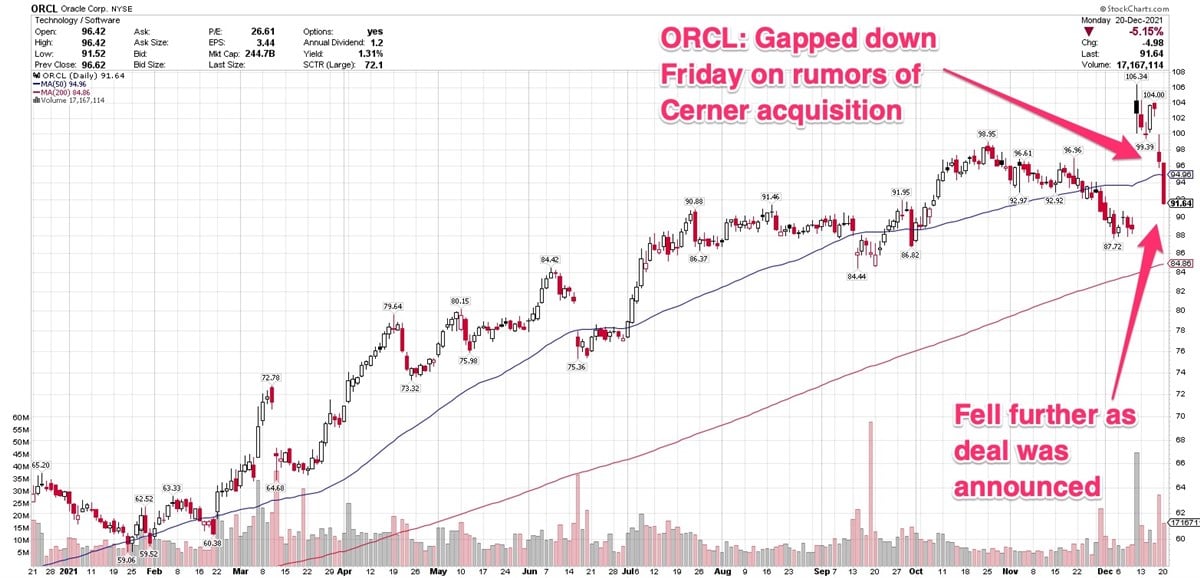Oracle Shares Down On News Of $28.3 Billion Cerner Acquisition
Shares of Oracle were trading 5% lower Monday, continuing a downtrend that began last week. On Monday, Oracle said it would buy medical software maker Cerner for $28.3 billion.

This story originally appeared on MarketBeat
Shares of medical-records software maker Cerner (NASDAQ: CERN) were trading higher again Monday, following news last week that database software giant Oracle (NYSE: ORCL) agreed to acquire Cerner for around $28.3 billion.
Cerner shares vaulted 12.93% Friday on rumors of the deal, which was formally announced Monday.
According to the companies’ joint release, Oracle’s all-cash tender offer is for $95 per share, or approximately $28.3 billion in equity value. That’s a premium of about 5% over where the stock was trading mid-session Monday.
Cerner provides digital information systems used within hospitals and health systems. For Oracle, the acquisition means adding healthcare industry customers to its portfolio of database and cloud-computing offerings.
“Working together, Cerner and Oracle have the capacity to transform healthcare delivery by providing medical professionals with better information—enabling them to make better treatment decisions resulting in better patient outcomes,” said Larry Ellison, Oracle’s chairman and chief technology officer, in the statement announcing the deal.
Lowering Administrative Workloads
“With this acquisition, Oracle’s corporate mission expands to assume the responsibility to provide our overworked medical professionals with a new generation of easier-to-use digital tools that enable access to information via a hands-free voice interface to secure cloud applications,” he added. “This new generation of medical information systems promises to lower the administrative workload burdening our medical professionals, improve patient privacy and outcomes, and lower overall healthcare costs.”
Oracle said it expects the acquisition to be immediately accretive to Oracle’s earnings on a non-GAAP basis in the first full fiscal year after closing, and to contribute substantially more to earnings in the second fiscal year and thereafter.
“Cerner will be a huge additional revenue growth engine for years to come as we expand its business into many more countries throughout the world,” said Oracle CEO Safra Katz in the statement. “That’s exactly the growth strategy we adopted when we bought NetSuite—except the Cerner revenue opportunity is even larger.”
Cerner has been essentially “dead money” for the past six years, unable to clear resistance above $80 (despite a very brief bounce above $84 in January). The stock has gone through several bouts as a growth leader in its history, but upward momentum has essentially stalled out recently.
Friday’s price action was the biggest move for Cerner in years.
Outperforming S&P 500 Recently
Oracle’s greatest era as a growth stock was in the 1990s. More recently it’s outperformed the S&P 500 at times.
In the past year, Oracle has handily outperformed the S&P 500.
The comparison with the S&P is appropriate, as Oracle has a market capitalization of $245.47 billion and is a component of the index. However, despite that large market cap, it comprises just 0.398266% of that index. As such, its price moves won’t have much, if any, effect on index performance.
Shares of Oracle were trading 5% lower Monday, continuing the downtrend that began last week. Shares gapped 6.39% lower Friday as the Wall Street Journal first broke news of the rumored Cerner acquisition.
Oracle gapped up 15.61% on December 10 on the heels of a better-than-expected fiscal second-quarter report, although its downside reversal means all those gains have been erased, and then some.
The boost was due to Oracle’s emphasis on cloud computing. Revenue came in at 10.4 billion, up 6% from the year-earlier quarter. Earnings were $1.21 per share, up 14%. Revenue, while growing in seven of the past eight quarters, was only up at single-digit rates during that time.
Oracle is a well-established tech that’s growing, but at slower rates than its faster-moving, mostly younger peers. Of course, a larger company can have the advantage of dividends, and that’s true for Oracle, whose trailing 12-month dividend yield is 1.24%.
Is Oracle a buy? At this juncture, I’d say no, although if you’re seeking a stock with a good combination of growth and income, it may be one to consider as it emerges from its current pullback. 
Cerner is a part of the Entrepreneur Index, which tracks some of the largest publicly traded companies founded and run by entrepreneurs.
Shares of medical-records software maker Cerner (NASDAQ: CERN) were trading higher again Monday, following news last week that database software giant Oracle (NYSE: ORCL) agreed to acquire Cerner for around $28.3 billion.
Cerner shares vaulted 12.93% Friday on rumors of the deal, which was formally announced Monday.
According to the companies’ joint release, Oracle’s all-cash tender offer is for $95 per share, or approximately $28.3 billion in equity value. That’s a premium of about 5% over where the stock was trading mid-session Monday.





